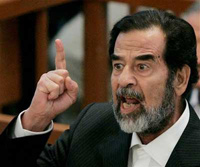
Former Iraqi President Saddam Hussein faces a fresh
trial on Aug. 21, 2006 for alleged genocide against Iraq's Kurds.
-Xinhua/Reuters
Former Iraqi President Saddam Hussein refused to enter a plea on genocide
charges and dismissed the tribunal as "a court of occupation," as his second
trial began Monday in Baghdad.
For most of the five-hour session, Saddam sat stone-faced in a courtroom in
the fortified Green Zone of Baghdad, listening to prosecutors give a detailed
account of how he and six co-defendants embarked on an eight-stage military
campaign in 1988 to eliminate the Kurds from swaths of their mountainous
homeland in northern Iraq, according to New York Times.
Saddam marched into the wood-railed defendants' pen at 11:45 a.m. local time,
wearing a charcoal suit and white shirt.
At the start of the trial, chief judge, Abdullah al-Amiri asked each
defendant to state his name, occupation and place of residence.
"I won't give you my name because all the Iraqis know my name," Saddam said.
The judge raised a book with the regulations to show to Saddam. "Do you
respect this law?"
Saddam paused before replying: "This is the law of the occupation." He
finally identified himself as "President of the Republic of Iraq and
Commander-in-Chief of the heroic Iraqi armed forces."
The judge entered a plea of not guilty for Hussein and one other defendant
who also refused to enter a plea.
Prosecutors said the campaign, called Anfal after a Koranic phrase that means
"the spoils of war," killed at least 50,000 Kurds and resulted in the
destruction of 2,000 villages. They showed the court photos of women and
children found in mass graves left from the campaign.
The trial is the second for Saddam in connection with alleged atrocities
during his regime, and it comes with the verdict from the first not expected
until Oct. 16 -- the killings of 148 Shiites in the town of Dujail in the 1980s
after an assassination attempt. Saddam faces execution by hanging if convicted
in either case.
Iraqis, meanwhile, were glued to the television sets at homes, offices and
coffee shops nationwide as the trial was broadcast on all local channels, AP
reported.
Mohammed Amin, 86, whose three sons were killed during the Anfal operations,
joined a crowd watching the trial on TV at a coffee shop in Sulaimaniyah.
"My dream came true today as I'm sitting in front of these criminals," he
said. "I'll be watching this trial until its end to convey the good news to my
sons in heaven."
Some expressed sympathy with Saddam.
"We all agree that there was genocide and crimes against humanity, but there
are other parties who are involved in this or backed it then," said Salman
Dawood, 45, a Sunni who owns a real estate business in Baghdad.
In the heart of Iraqi Kurdistan, people were transfixed, seeing the Anfal
case as a chance for vengeance. Survivors of the Anfal campaign organized
rallies in several villages. Some wept as they recalled the tragedy; others
expressed happiness that he was being tried.



